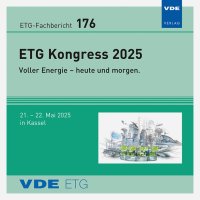A modular Architecture for Congestion Management using Cross Voltage Level Power Flow Controllers and Energy Hubs
Conference: ETG Kongress 2025 - Voller Energie – heute und morgen.
05/21/2025 at Kassel, Germany
Proceedings: ETG-Fb. 176: ETG Kongress 2025
Pages: 6Language: englishTyp: PDF
Authors:
Nerowski, Christian; Grafenhorst, Simon; Schmitt, Susanne; Lindner, Martin; Foerderer, Kevin; Rehtanz, Christian; Hagenmeyer, Veit
Abstract:
The ongoing integration of renewable generation into the power system requires advanced control algorithms to maintain grid stability. In this paper, we explore an innovative approach to effectively manage energy resources in a distribution network using a Congestion Management System (CMS). The CMS operates at medium voltage level and locates bottle-necks that need to be relieved. By considering a Cross Voltage Level Power Flow Controller (CPFC) in the operation of the CMS, we illustrate how a new reference setpoint for an underlying network can prevent curtailments and increase the renewable hosting capacity. There, the CPFC allows for the remote control of power flows to provide ancillary services to higher voltage levels through Active Distribution Networks (ADNs), while mitigating congestions through power and energy flexibility analysis. In addition, this paper considers the use of an Energy Hub, a multi-energy resource system that optimizes its components to mitigate grid congestions, reduce greenhouse gas emissions, or minimize energy costs. By defining the interactions between the CMS and the CPFC, respectively Energy Hub, we propose a modular architecture to support the CMS in achieving a congestion-free network. By integrating both modules, we can adjust the setpoints of assets dynamically, prevent congestions caused by excessive injection, and maximize network utilization. The proposed framework demonstrates effective flexibility coordination, paving the way for a resilient and efficient power system.


